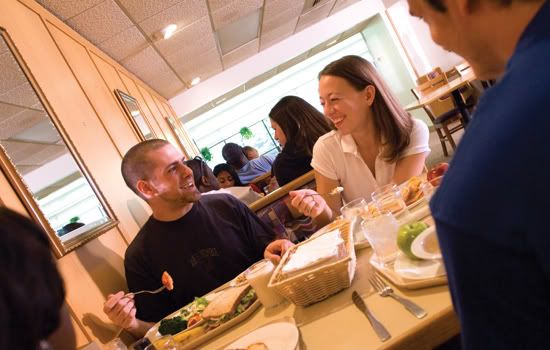In formal settings, all the silverware, glassware, cups, saucers and the like are placed on the table, so it’s often difficult to know which fork to use when or which water glass is yours. As a general rule to thumb, silverware is lined up in the order in which a person will use them, going from the outside, in. For instance, the fork and knife used for the salad are placed in the outermost of the setting, farthest from your plate (with the exception of the spoon). Dessert silverware, if not brought out with the dessert, are placed at the top of your entrée plate. Glassware, cup and saucer are placed to your right, while the napkin, bread plate and butter spreader to your left.
10 Table Manner Tips
Now that you know how the table setting is laid out and when to use each, here are 10 tips for the duration of the meal:
- When dining with six or more, it’s polite to wait till roughly 50% of the table has their food before starting your meal. In smaller groups, wait until the entire table has their food, unless food temperature is at high risk in decreasing the enjoyment of the meal, and/or others at the table incessantly insist you begin.
- You can and should use your knife to cut large pieces of lettuce or other ingredients in your salad. Nothing is worse than trying to shove a large piece of lettuce in your mouth and having some of it stick out. (No brainer, but this applies to your entrée as well.)
- The proper way to butter a piece of bread is to rip off a piece that’s about one or two bites in size, butter it, and eat it. Repeat. Never bite straight into a roll, and refrain from cutting it in half and buttering.
- While cutting meat, the correct way is to cut a piece and then switch your fork to your right hand to pick it up. This method is considered the “American” way. Not switching your fork and using your left is called the “Continental” way, and is done most often in European countries. This way is gaining acceptance and I wouldn’t be surprised if one day soon it’s considered acceptable in fine dining. Also, cut meat a piece at a time. Cutting the entire meat up into pieces or cutting more than one at a time is tacky.
- Wipe your mouth before taking a sip of your drink. It’s unsightly to see food particles or grease on the rim of your glass. Also, it’s considered rude to take a sip of your drink with your mouth full. Plus, backwash is gross!
- When leaving the table during the course of your meal, put your napkin on your chair, not the table. No one wants to see your stained napkin. And at the completion of the meal, place it on the left of your plate, or if your plate has been cleared, in the center.
- When in a situation where you have to pass food or condiments to others at the table, pass it to your right, or counter clockwise. Never do a “boarding house reach” across the table.
- When you don’t want to swallow a piece of food in your mouth (e.g. a bone or a piece of fat), move the piece to the front of your mouth and use your fork (or spoon if that’s what you were using) to retrieve it from your mouth and into the side of your plate. The only time its okay to use your fingers is when it’s a fish bone.
- To get the waiter’s attention, the most polite way is to make eye contact. However chances are they are busy and/or are ignoring you. It’s acceptable to raise your hand to head level, just don’t go overboard by raising it way above your head and wave it about.
- When you’re done with your meal, the proper placement of the silverware is to lay them parallel to each other and across the plate with the handles facing the right. To clarify, the ends would be facing 10 o’clock and four. Note: Not all waiters will know this and they still may ask you if it’s okay to clear your plate. At least you appear classy.



No comments:
Post a Comment